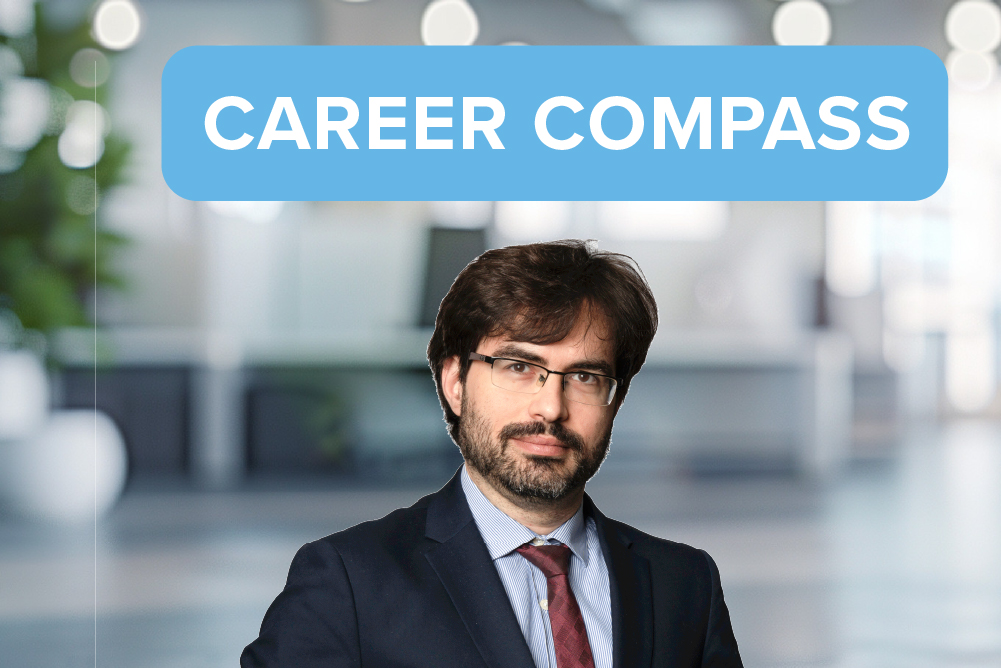
Driving Digital Transformation at SCOR
24 octobre 2025
A Conversation with David Suetterle
In this edition of the Career Compass, we sit down with David Suetterle, CEO of SCOR Digital Solutions and newly appointed Chief Digital and Transformation Officer (CDTO). David shares insights into his dual role, SCOR’s evolving digital strategy, and why SCOR is a compelling destination for tech and data professionals.
You are CEO of SCOR Digital Solutions and now also Chief Digital and Transformation Officer. Can you tell us a little about these roles and how they are complementary?
Absolutely. These two roles are complementary and reflect SCOR’s evolution under the Forward 2026 strategy. As CEO of SCOR Digital Solutions, my focus has been on delivering digital solutions to our clients, particularly life and health insurers, by building AI-supported workflows in underwriting and claims. As CDTO, I now also drive internal transformation, building a digital execution platform across SCOR’s business lines. Bringing these roles together allows us to connect external innovation with internal transformation, ensuring SCOR becomes more agile, AI-driven, and ready for the future.
How will the Digital and Transformation Office change the way tech and data are leveraged at SCOR?
The Digital and Transformation Office is a strategic enabler. Historically, transformation was seen mainly as cost optimization. Today, it’s about becoming an AI-first, data-driven organization. We’re shifting from project-based delivery to a product-centric model, embedding tech and data into core processes like underwriting and claims. This aligns directly with our Forward 2026 strategic plan, which emphasizes operational excellence and tech and data developments to drive smarter decision-making.
How important is collaboration to accomplishing your goals? What does this look like to you?
Collaboration is absolutely essential to everything we do, especially in the context of digital and transformation. The challenges we face are complex, not just complicated. That requires cross-functional teams, agile methodologies, and transparent objectives. We’re moving from siloed leadership to a more fluid, empowered model where teams own their outcomes. Change management is key: successful transformation is 70% about people and processes, and only 30% about tech, data, and AI.
How is your transformation strategy aligned with the modernization of SCOR’s operating model?
We’re not just digitizing existing workflows but we’re redesigning them from the ground up to be future-ready. Think of it like building with Lego blocks: with AI and cloud-native architecture, we can reimagine processes and create entirely new, modular systems of capabilities which can be easily adapted, just like a flexible Lego structure. This increases scale, improves portfolio management, and enhances both underwriting results and operational efficiency.
Can you give examples of early initiatives and achievements such as AI use cases, digital workflows, or process simplification?
One early initiative was Data Capture AI, which helps underwriters process large medical files efficiently. We learned that seamless integration into existing workflows is key to adoption. Another promising area is augmented underwriting, where AI transforms these workflows and supports, rather than replaces, human decision-making by structuring data, summarizing key insights, and guiding underwriters to high-value cases. These initiatives are now expanding from L&H into P&C, with tailored approaches for each domain.
What challenges have you encountered in your new role, and how were they addressed?
One major challenge is coordinating SCOR’s knowledge-driven workforce. There’s a strong desire to modernize, but efforts can be fragmented. My role is to connect the dots, ensuring initiatives are aligned, scalable, and not duplicative. We’re fostering agility while maintaining focus, especially as AI evolves rapidly.
How are you leveraging lessons learned from your role as CEO of SCOR Digital Solutions in your work as CDTO?
Leading SCOR Digital Solutions taught me that meaningful impact comes from solving real business problems with tech and data, not the other way around. We adopted a product-driven, agile model, emphasizing continuous investment and cross-functional collaboration. These principles now guide our broader transformation efforts at SCOR.
How do you ensure a digital mindset across teams?
SCOR’s workforce is already technically-minded, but we’re embedding digital thinking into how we work. We promote AI and data-first approaches, share success stories, and invest in upskilling. Initiatives like our AI-first policy in process reviews encourage curiosity and challenge the status quo.
What are your top priorities moving forward with the Digital and Transformation strategy?
Focus is key. We’re prioritizing underwriting, claims, retrocession, and finance, simplifying workflows and embedding AI capabilities. We’re also evolving our operating model to be more holistic and scalable, aligning tech and data capabilities with business priorities to deliver meaningful impact.
What does your vision of SCOR’s digital transformation look like in five years?
Looking five years ahead, it’s difficult to predict specifics given the pace of change – but that’s exactly why we must keep moving forward. We’ll be at the forefront of AI adoption, leveraging agility and innovation to stay ahead. It’s not just about digitalizing; it’s about reimagining how we work.
Why should SCOR be seen as an attractive employer for those seeking a career in tech and data? What advice do you have for candidates?
SCOR sits at the intersection of global impact and innovation. Whether it’s climate modeling or health risk tech, our work has real-world impact. We offer access to cutting-edge technologies, rich datasets, and a collaborative culture. My advice? Besides technical skills, focus on developing your soft skills: curiosity, emotional intelligence, and teamwork are just as critical as technical expertise.
Related articles








